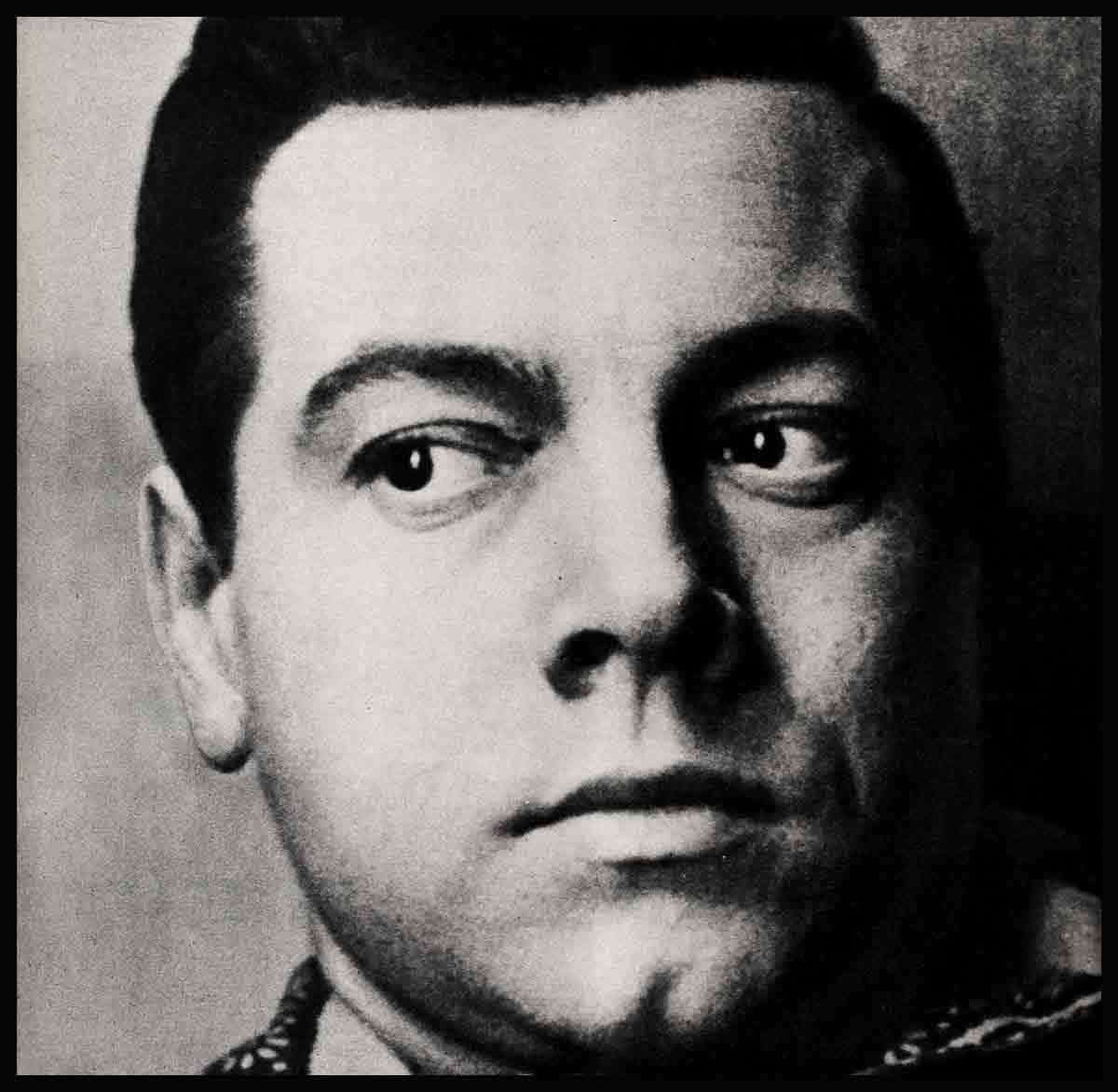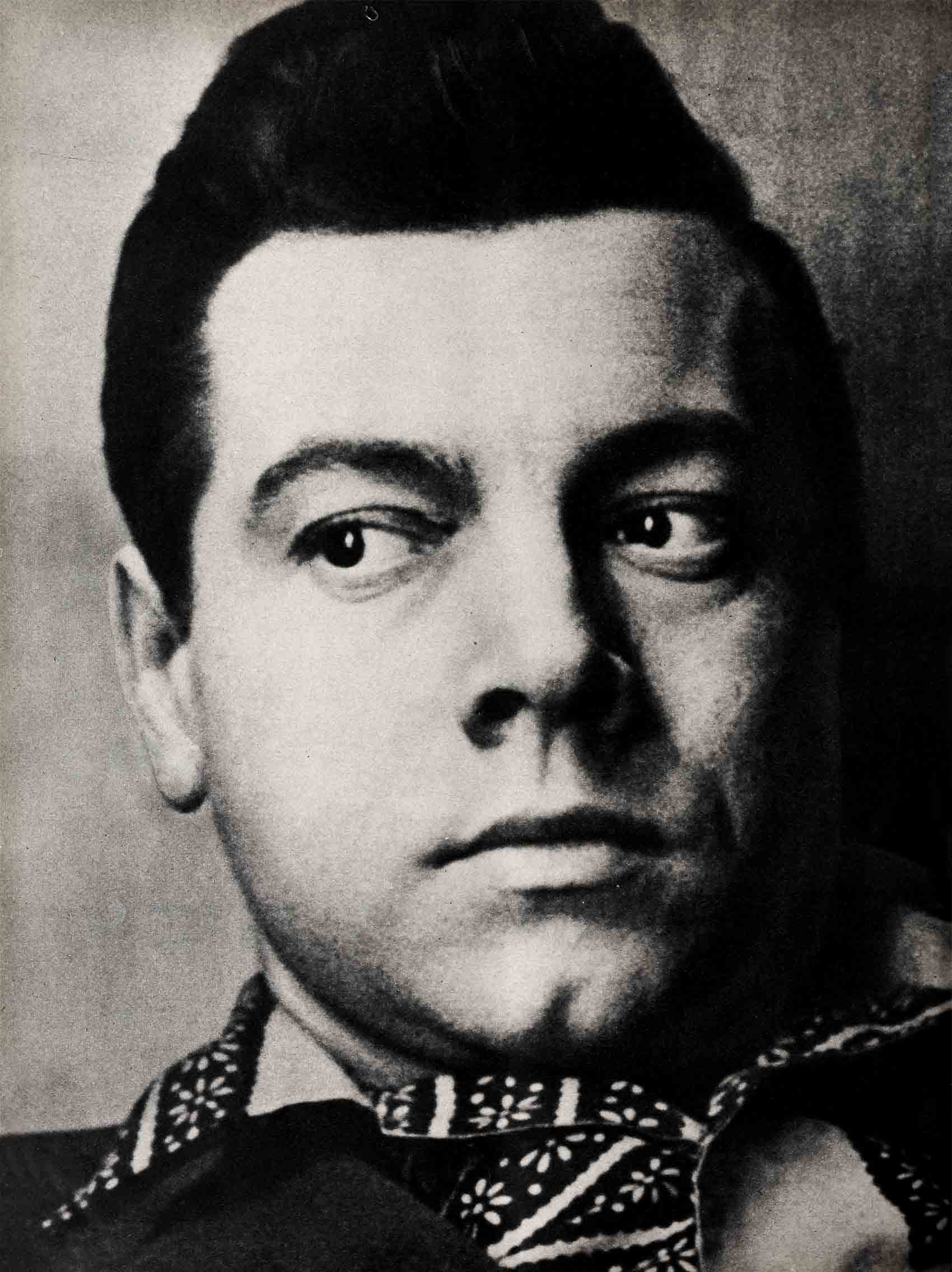
The Truth Behind The Mario Lanza Blow-Up!
There are those who say that life with Lanza—personal or professional—has never been peaceful, whether B.C. (before “Caruso”’) or since.
But in six turbulent weeks last August and September, the top box-office tenor of the movie industry chalked up a record of sound and fury which has never been matched in the memory of long-time reporters of the Hollywood scene.
In those six chaotic weeks, Mario did the following things:
1. He broke with his long-time personal manager and closest friend, Sam Weiler. Lawsuits may be in the offing as a result—possibly both Lanza vs. Weiler and Weiler vs. Lanza, so comment on the justness of Mario’s allegations is improper. However, it’s a matter of open knowledge that Weiler is the man who financed Mario’s musical training, under-wrote the young singer and his wife for a period of years while Mario prepared for the concert stage. To music-worshipping Sam Weiler, Mario Lanza was more than a client. He was the voice—a responsibility almost sacred, a cause and a crusade.
2. Mario failed to report for work on “The Student Prince” at M-G-M, and was suspended.
3. He returned to the studio—and to the payroll—reported for wardrobe fittings, rehearsed his musical numbers, recorded a song with principals, chorus and the huge studio orchestra. Yet, unaccountably, while in the midst of this conscientious day’s work, he was apparently able to make enemies of practically every person important to the production—with the exception of leading lady Ann Blyth.
4. The next day, he rehearsed and broadcast his radio show—his last before cancellation—exhibiting the same sort of surprising behavior which had alienated his co-workers at Metro.
5. He failed once more to show up for work on his picture. After three days of this, the studio cried, “Uncle,” declared Mario in breach of contract, chopped him—and thousands of workers who would have contributed to and earned from “The Student Prince”—off the payrolls. On the production, to that date, a reported $700,000 had already been spent—about half of which was irretrievable with Mario out of the cast. After ominous warnings, M-G-M—on September 20th—brought suit against Mario for $5 195,888. Mario, at the time, had “no eminent,” despite the fact that, conceivably, every cent that he earned after this—from records, concerts, opera engagements or whatever—could be attached pending resolution of the legal impasse.
6. Mario sent word that he was “just relaxing” when reporters tried to get in touch with him to get his side of the story. He went right on “relaxing” when his broadcast series was canceled.
7. Reportedly, Mario quarreled with Betty, his fighting Irish wife, who has always supported him valiantly. He allegedly stayed away from his home in order to avoid reporters. Thus, Betty was left to cope with the press and the lawyers and the just-plain-curious as best she could.
8. He dropped out of sight for days, while reporters speculated about his whereabouts. One widely circulated guess had him on the way to New York for a conference with the Big Boss of M-G-M, Nick Schenck. Actually, he had gone into semi-retirement at the San Fernando Valley ranch of his old and good friend John Carroll.

9. Shortly before Metro’s announcement of the suit, Mario turned up at the studio with Carroll, whom he introduced as his “personal manager,” to make conciliatory overtures. At that time, the studio announced that it had taken under advisement his offer to resume work on “The Student Prince.”
10. Then Mario quarreled with John Carroll, and at last report, had moved into his parents’ home.
That this list of inconsistencies can be recited and half of Hollywood still hold its fire is indicative of the wave of sympathy which has surged up for Mario.
The feeling of the people who suffer for him—rather than feel any ill will toward him—was summed up in one short sentence by Ann Blyth when she was advised by phone that “The Student Prince”—in which, incidentally, she was to have had the best break of her career—was canceled. “Oh, that poor, poor boy!” she said. And she cried.
Again and again, pleasant stories—stories of Mario at his most engaging and charming—are being told. One that people are remembering fondly is the story of his appealing behavior at last year’s Photoplay Gold Medal Awards dinner. Mario, one of the award winners, said shyly that night that he would prefer not to sit up on the dais with the other winners, but would rather, if there were no objections, sit in the background with his parents, who, he felt, would be more at ease among people they didn’t know, if he were with them.
Actually, Mario being Mario, every one of his talk-provoking forays during those six turbulent weeks of crisis can be reversed even before this story is in print. There is hopeful speculation, as we go to press, that the selection of his latest picture. “Because You’re Mine,” by the British Motion Picture Association for a London Royal Command performance may furnish the emotional fillip necessary to turn the trick. Traditionally, the leading players in the film selected appear before the Royal Family—and Mario speedily indicated his willingness to go to London.
With the exception of “That Midnight Kiss,” his first film, every Mario Lanza picture has been shut down and threatened with cancellation at least once before the cyclonic tenor smoked a pipe of peace and got down to work. It is possible that “The Student Prince” will still be made, and with Lanza. It is even probable, if Mario will back down from his hold-out demand for “complete artistic supervision.”
M-G-M is not giving “complete artistic supervision” to any actor, and certainly not to one so young, and, despite his meteoric success, so inexperienced as Mario. The history of Hollywood is too crowded with examples of stars who fought for, and got, “complete artistic supervision” and promptly fell on their well-preserved faces.
Metro will hold out as long as Mario, and Metro will win—will pick its own directors, producers, writers, players, and musicians—or Metro won’t play.
So Mario, if he makes “The Student Prince,” will have to back down finally. Chances would be better for this—and it could happen—if Mario and Sam Weiler kissed and made up.
Just before their break-up, Weiler told this reporter: “Mario and I have never had an argument. We have disagreed, usually we have been able to compromise. If we couldn’t compromise, then I conceded that Mario must be right. I’m not as great as he is.” Weiler will forgive and forget, if Mario will.
And Betty Lanza will forgive, if not forget. Divorce would seem out of the question for the Lanzas. In the first place, their religion forbids it. Also, Mario’s parents would be crushed by such an eventuality. And, most importantly, Betty loves Mario. And he loves her and their children.
Beyond these facts, we can only speculate about the obvious and visible contradictions in his personality. We can make note of Lanza’s remarkable lack of modesty, remembering that this is a man who, as a buck private in the army, pasted onto a Caruso record a new label of his own making, “Mario Lanza, Tenor, with Koussevitsky and the Berkshires Orchestra,” and mailed it to officers scouting talent for an Air Force show.
But then we must remind ourselves that Hollywood is filled with people you wouldn’t tag as “shrinking violets.”
To Mario Lanza as a child, Caruso was a demigod of a greatness never to be aspired to by mere mortals. But Mario Lanza, as a man, played—and sang—as Caruso. Some critics even said he was as great as Caruso. Possibly Mario, in his hour of triumph, might have dreamed a bit too daringly. Perhaps, to this gifted and lucky young man, it might have appeared in a moment of over-confidence that he was another Caruso.
But, as so often happens when an ego appears to get out of hand, what looked like billowing self-esteem in Mario’s case may have been counterpointed—even dominated—by something very close to fear. Secret, unspoken fear.
What if he wasn’t good enough? What if he wasn’t “ready,” what if he should fail? One way not to fail is not to try.
His irresponsibility now could be “temperament.” But it could also be motivated by deepset fear—un-admitted, even to himself.
Whatever the wellsprings of Mario’s problem, it is to be hoped that somehow, and soon, he can find help, and—through that help—the strength to admit first that he has a problem, and then the strength to face and to solve it.
Otherwise, one of the greatest voices of our time, one of the most promising talents, may be lost to the world.
THE END
—BY GEORGE ARMSTRONG
It is a quote. PHOTOPLAY MAGAZINE DECEMBER 1952




